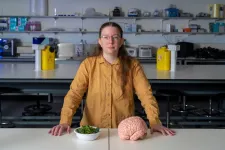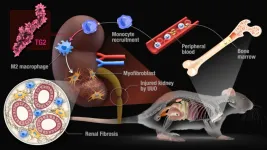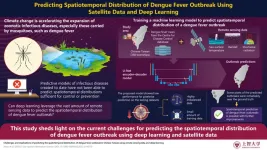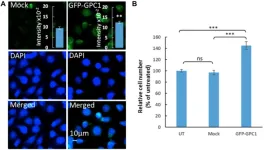(Press-News.org) More magnesium in our daily diet leads to better brain health as we age, according to scientists from the Neuroimaging and Brain Lab at The Australian National University (ANU).
The researchers say increased intake of magnesium-rich foods such as spinach and nuts could also help reduce the risk of dementia, which is the second leading cause of death in Australia and the seventh biggest killer globally.
The study of more than 6,000 cognitively healthy participants in the United Kingdom aged 40 to 73 found people who consume more than 550 milligrams of magnesium each day have a brain age that is approximately one year younger by the time they reach 55 compared with someone with a normal magnesium intake of about 350 milligrams a day.
“Our study shows a 41 per cent increase in magnesium intake could lead to less age-related brain shrinkage, which is associated with better cognitive function and lower risk or delayed onset of dementia in later life,” lead author and PhD researcher Khawlah Alateeq, from the ANU National Centre for Epidemiology and Population Health, said.
“This research highlights the potential benefits of a diet high in magnesium and the role it plays in promoting good brain health.”
It’s believed the number of people worldwide who will be diagnosed with dementia is expected to more than double from 57.4 million in 2019 to 152.8 million in 2050, placing a greater strain on health and social services and the global economy.
“Since there is no cure for dementia and the development of pharmacological treatments have been unsuccessful for the past 30 years, it’s been suggested that greater attention should be directed towards prevention,” study co-author Dr Erin Walsh, who is also from ANU, said.
“Our research could inform the development of public health interventions aimed at promoting healthy brain ageing through dietary strategies.”
The researchers say a higher intake of magnesium in our diets from a younger age may safeguard against neurodegenerative diseases and cognitive decline by the time we reach our 40s.
“The study shows higher dietary magnesium intake may contribute to neuroprotection earlier in the ageing process and preventative effects may begin in our 40s or even earlier,” Ms Alateeq said.
“This means people of all ages should be paying closer attention to their magnesium intake.
“We also found the neuroprotective effects of more dietary magnesium appears to benefit women more than men and more so in post-menopausal than pre-menopausal women, although this may be due to the anti-inflammatory effect of magnesium.”
Participants completed an online questionnaire five times over a period of 16 months. The responses provided were used to calculate the daily magnesium intake of participants and were based on 200 different foods with varying portion sizes. The ANU team focused on magnesium-rich foods such as leafy green vegetables, legumes, nuts, seeds and wholegrains to provide an average estimation of magnesium intake from the participants’ diets.
The research is published in the European Journal of Nutrition.
END
A higher dose of magnesium each day keeps dementia at bay
2023-03-23
ELSE PRESS RELEASES FROM THIS DATE:
2022 heatwave struck off surgery in fifth of UK hospitals
2023-03-23
The 2022 summer heatwave resulted in a fifth of UK hospitals being forced to cancel operations during the three days when temperatures soared, a new study reveals.
Had the high temperatures continued, a further third of hospitals would have had to cancel surgery, as NHS buildings are not set up to withstand dangerously high temperatures.
The team surveyed surgeons, anaesthetists, and critical care doctors working during the heatwave of 16 – 19 July 2022.
They received 271 responses from 140 UK hospitals with one in five ...
British Ecological Society calls for greater funding for ecological research and sets out research agenda for next 25 years
2023-03-23
Two landmark reports published today (23 March) by the British Ecological Society reveal that ecological sciences are losing out on funding compared to other sciences. The reports also set out a research agenda for ecology over the next 25 years.
With the twin crises of climate change and biodiversity loss, an ecological understanding of the world has never been more pivotal to the future of humanity and all life on Earth.
To further this ecological understanding and highlight the importance of ecology to our future, the British ...
At least 80% of the world’s most important sites for biodiversity on land currently contain human developments, study finds
2023-03-23
PRESS RELEASE FROM THE UNIVERSITY OF CAMBRIDGE
EMBARGOED UNTIL 00.05 LONDON TIME (GMT) ON 23 March 2023
Paper available at: https://drive.google.com/drive/folders/18wVryz17-8PmtYDudp5NPXE75onO12FF?usp=sharing
At least 80% of the world’s most important sites for biodiversity on land currently contain human developments, study finds
At least 80% of sites identified as being internationally important for biodiversity on land currently contain infrastructure − of which more than 75% contain roads.
In the future, more sites that are important for biodiversity could contain powerplants, mines ...
Enzyme-regulating macrophages found in both humans and mice open the door to translating findings in mice into human therapies.
2023-03-23
Researchers at Nagoya University in Japan have identified two enzymes that are involved in macrophage polarization, one of the key factors affecting fibrosis. The group’s findings, reported in Cell Death & Disease, suggest a potential treatment for human patients.
Kidney fibrosis is a dangerous inflammatory disease that causes the organs to stiffen and lose normal function. The disease is linked to a process called macrophage polarization. Polarization is the process by which macrophages, the white blood cells that help the body fight infection and repair tissue, are changed into two types as a response to changes in the microenvironment of the cell: the M1 type, which ...
Can artificial intelligence predict spatiotemporal distribution of dengue fever outbreaks with remote sensing data? New study finds answers
2023-03-23
Outbreaks of zoonotic diseases, which are those transmitted from animals to humans, are globally on the rise owing to climate change. In particular, the spread of diseases transmitted by mosquitoes is very sensitive to climate change, and Chinese Taiwan has seen a worrisome increase in the number of cases of dengue fever in recent years.
Like for most known diseases, the popular saying “an ounce of prevention is worth a pound of cure” also rings true for dengue fever. Since there is still no safe and effective vaccine for all on a global scale, dengue fever prevention efforts rely on limiting places where mosquitoes can lay their eggs and giving people an early warning when ...
New in-home AI tool monitors the health of elderly residents
2023-03-23
Engineers are harnessing artificial intelligence (AI) and wireless technology to unobtrusively monitor elderly people in their living spaces and provide early detection of emerging health problems.
The new system, built by researchers at the University of Waterloo, follows an individual’s activities accurately and continuously as it gathers vital information without the need for a wearable device and alerts medical experts to the need to step in and provide help.
“After more than five years of working on this technology, we’ve demonstrated that very low-power, millimetre-wave radio systems enabled by machine learning ...
New insights into the origins of spinal muscular atrophy
2023-03-22
NEW YORK, NY--Columbia researchers have discovered how a genetic defect leads to spinal muscular atrophy (SMA), a critical piece of information about the disease that neurologists have been seeking for decades.
The discovery suggests a new way to treat SMA—a devastating childhood motor neuron disease that affects 1 in 6,000 children. In the most severe cases, and when left untreated, children born with SMA die within the first two years of life.
The researchers also used their finding to develop an experimental therapy that improved survival in mice with severe SMA by ...
Oncotarget | Attenuation of cancer proliferation by suppression of glypican-1
2023-03-22
“This study was designed to increase the knowledge on the potential of GPCs and in particular GPC1 as a biomarker in cancer diagnosis and prognosis.”
BUFFALO, NY- March 22, 2023 – A new research paper was published in Oncotarget's Volume 14 on March 21, 2023, entitled, “Attenuation of cancer proliferation by suppression of glypican-1 and its pleiotropic effects in neoplastic behavior.”
Glypicans (GPC1-6) are associated with tumorigenic processes and their involvement in neoplastic behavior has been ...
Geothermal energy has potential to be cost-competitive with other renewables and fossil fuels
2023-03-22
CAMBRIDGE, Mass.—Clean geothermal energy—the heat beneath our feet—has the potential to be cost competitive with other renewables and even fossil fuels if we can drill deep enough to access the mother lode of the resource. That’s according to one speaker at a geothermal conference last month held by the Society of Petroleum Engineers (SPE). Other speakers addressed growing interest in the field by the oil and gas sector, key challenges it faces, and solutions to help solve those challenges.
Geothermal 2023: Realising the Ambition was organized by the Aberdeen, ...
Towards reducing biodiversity loss in fragmented habitats
2023-03-22
When natural habitats are cleared to make way for cities, roads and agriculture, this often leaves behind “islands” of fragmented habitat that can place species at risk of extinction. Species are at risk when they find it hard to move among habitat patches to find resources and reproduce.
By combining lab experiments and mathematical modelling, researchers at McGill University and the Swiss Federal Institute of Aquatic Science and Technology have found a way to predict the movement of species that could guide conservation efforts to reconnect fragmented habitats.
The ...





